Effect of Low Temperature Vacuum Slow Cooking on Muscle Quality Characteristics of Half Shell Scallop
-
摘要: 以半壳栉孔扇贝为原料,通过感官品质、汁液损失率、水分含量、水分活度、质构、肌原纤维蛋白提取及微观结构等指标研究不同处理温度(60、65、70、75、80 ℃)、不同处理时间(30、45、60、75 min)的真空低温慢煮(sous vide,SV)对半壳扇贝肌肉品质特性的影响。结果表明,随着烹饪温度的升高和时间的延长,SV扇贝的感官评分值呈现先升高再降低的趋势,在70和75 ℃煮制30 min时感官评分值最大;60~75 ℃间SV扇贝汁液损失率升高但无显著性差异(P<0.05),当温度升高至80 ℃时,SV扇贝汁液损失率显著升高(P<0.05);60~70 ℃间,延长烹饪时间,样品水分含量无显著性差异(P>0.05),75~80 ℃间,延长烹饪时间,样品水分含量显著降低(P<0.05);温度大于70 ℃时,相同烹饪时间,随温度升高,扇贝硬度降低(P<0.05);随时间和温度升高,剪切力显著升高(P<0.05);温度升高时间增大,肌原纤维蛋白提取率降低,在75和80 ℃时,延长烹饪时间肌原纤维蛋白提取率未发现显著降低(P>0.05);扫描电镜和HE染色观察显示,随烹饪温度升高,肌纤维断裂,边界模糊,断裂的肌纤维交联,混乱程度升高,最后断裂的肌纤维聚集成大团。综上,70和75 ℃真空烹饪30 min的扇贝感官品质最佳,此时产品汁液损失率、弹性均小于对照组(100 ℃,15 min),水分含量、水分活度、硬度、肌原纤维蛋白提取率均高于对照组。该实验结果为 SV 半壳扇贝的工业化生产,保障流通时 SV 半壳扇贝品质提供理论支持。Abstract: This study utilized half-shell Chlamys farreri as the primary material to investigate the effects of different sous vide (SV) cooking temperatures (60, 65, 70, 75, 80 ℃) and cooking times (30, 45, 60, 75 min) on the quality attributes of the Chlamys farreri muscle. Sensory quality, drip loss, moisture content, water activity, texture, myofibrillar protein extraction, and microstructure were evaluated as key indicators. The results showed that as the cooking temperature and time increased, the sensory scores of SV Chlamys farreri initially rose and then declined, with the highest sensory score observed at 70 and 75 ℃ after 30 minutes of cooking. The drip loss of SV Chlamys farreri increased between 60 and 75 ℃ without significant differences (P<0.05), but significantly increased at 80 ℃ (P<0.05). In the temperature range of 60~70 ℃, there was no significant difference in moisture content with extended cooking time (P<0.05), while between 75 and 80 ℃, the moisture content significantly decreased with prolonged cooking (P<0.05). When the temperature exceeded 70 ℃, the hardness of the scallops reduced with an increase in temperature for the same cooking time (P<0.05). Shear force significantly increased with longer SV cooking time and higher temperatures (P<0.05). The extraction rate of myofibrillar protein decreased with the increase of temperature. No significant decrease was found in myofibrillar protein extraction rate at 75 and 80 ℃ for prolonged cooking time (P>0.05). Scanning electron microscopy and HE staining illustrated that as the cooking temperature increased, myofibrils underwent breakage, boundaries became indistinct, fractured myofibrils were cross-linked, and the disorder level escalated, ultimately leading to the aggregation of broken myofibrils into large masses. In conclusion, the optimal sensory quality of the scallops was achieved at 70 and 75 ℃ with 30 minutes of SV cooking, where drip loss and elasticity were lower than those in the control group (100 ℃, 15 min), while moisture content, water activity, hardness, and myofibrillar protein extraction rate were higher than those in the control group.
-
Keywords:
- Chlamys farreri /
- sous vide cooking /
- quality characteristics /
- myofibrillar protein
-
真空低温慢煮(sous vide,SV)是一种在相对较低的温度下长时间加热真空包装食品配料的烹饪方法。与传统的烹饪方法相比,用SV方法加工的产品加热温度约为65~95 ℃,加热时间在1~7 h[1],此温度和时间加工下制品营养损失较小,感官特性良好,且同样可以达到传统加工使酶和微生物灭活的效果,同时真空包装,可以有效避免食品贮藏过程中二次污染[2]。该技术已广泛应用于不同类型食材,肉类如鸡肉、牛肉、羊肉等[3−5],果蔬类如胡萝卜、土豆等[6−7]。近些年SV开始逐渐应用于水产品加工,如蟹腿肉、大黄鱼、欧洲海鲈鱼等[8−19]。水产品在储存过程中,由于内源性酶活性、厌氧微生物生长、蛋白质和脂质氧化等不同的生化反应和微生物生长,导致三甲胺(trimethylamine,TMA)和挥发性盐基氮(total volatile basic nitrogen,TVB-N)等物质的形成,鱼类极易腐败。SV烹饪技术的应用可以使内源性酶失活,杀死导致腐败的好氧微生物,同时保持产品高品质和感官特性。
栉孔扇贝(Chlamys farreri)富含丰富的蛋白质,还富含硒元素、维生素、氨基酸、多不饱和脂肪酸等多种营养素[11]。鲜活扇贝的水分和蛋白质含量较高,自身携带的微生物丰富,所以生鲜扇贝极易受内源酶和腐败微生物的破坏,贮藏成本较高,因此市场上多以干制品或冷冻制品的形式流通售卖[12]。但是干制品对贮藏环境要求较高且食用方式单一,冷冻扇贝则仍会被部分微生物和酶破坏,保持扇贝感官品质的效果不尽人意[13]。SV烹饪的工艺条件对产品的营养价值和感官特性影响极大[14]。因此,从生产优质、安全食品的角度,探究SV烹饪半壳扇贝适合的温度和时间意义重大[15]。
因此,本文以栉孔扇贝为对象,研究SV加工对半壳栉孔扇贝品质的影响,旨在探究SV烹饪半壳扇贝闭壳肌理化性质的变化,确定最适合半壳栉孔扇贝的SV烹饪条件,为工业化生产提供理论支撑,丰富人们对扇贝的消费方式[16]。
1. 材料与方法
1.1 材料与仪器
栉孔扇贝(重约65±5 g) 舟山国际水产城,鲜活的扇贝样品置于装有冰袋的泡沫箱里1 h内运送至实验室;无水乙醇、磷酸氢二钠、磷酸二氢钠 分析纯,国药化学试剂有限公司;4%多聚甲醛溶液 北京雷根生物技术有限公司;Masson染色试剂盒 武汉谷歌生物科技有限公司;总蛋白含量测定试剂盒 南京建成生物研究所。
Heraeus Multifuge X1R高速冷冻离心机 美国Thermo Fisher科技有限公司;T18 digital ULTRA-TURRAX数显匀浆机 德国IKA公司;HD-3A型智能水分活度测量仪 无锡市华科仪器仪表有限公司;TMS-Pilot 物性测试仪 美国食品科技公司(FTC);CS-210型色差仪 杭州彩谱科技有限公司;SU8100扫描电子显微镜 日本日立公司。
1.2 实验方法
1.2.1 样品处理
将扇贝样品外壳泥沙及污渍洗刷干净,自来水淋洗;用无菌解剖刀从壳一侧、贴壳快速切断闭壳肌(保持贝肉完整,无裂痕),将贝肉保留在半壳内;手动去除闭壳肌周围的外套膜及内侧的内脏团;用吸水纸吸去贝肉和贝壳表面的水分后,用耐热的聚乙烯(PE)真空包装袋包装半壳扇贝,抽真空45 s后真空封口(真空度为0 Mpa)。真空包装的半壳扇贝分别在60、65、70、75和80 ℃下水浴30、45、60和75 min低温慢煮,然后在4 ℃冰水中冷却10 min,手动搅拌,加速冷却[17]。以100 ℃水浴15 min的真空包装的半壳扇贝为对照组,在24 h内完成所有样品的测定。
1.2.2 感官评价
按照杨婷婷等[18]的方法建立感官评价小组,验证小组成员感官评价能力和确定SV烹饪半壳扇贝的描述词,组成6人的评价小组,依据表1对SV半壳扇贝的色泽、气味、多汁性、组织硬度、组织弹性、可接受性进行评分[19]。
表 1 SV半壳扇贝感官评分标准Table 1. Sensory evaluation standards for SV half-shell scallops指标(分) 评分标准 色泽(0~10) 蒸煮液浑浊不透明到蒸煮液澄清透明,无组织碎片 气味(0~10) 腥味不能接受到无腥味有浓郁的扇贝鲜甜味 多汁性(0~10) 没有汁水到汁液丰富无纤维感 组织硬度(0~10) 表皮发硬到表皮柔软无明显表面硬化 组织弹性(0~10) 完全没有弹性到富有弹性 可接受度(0~10) 完全不能接受到普遍可接受 1.2.3 汁液损失率测定
按照下式计算SV半壳扇贝的汁液损失率。
蒸煮损失率(%)=M1−M2M1×100 式中:M1表示真空包装的半壳扇贝重量,mg;M2表示SV烹饪后打开真空袋,用纱布擦拭去除贝肉表面、真空袋中水分后的重量(包含半壳扇贝、真空袋),mg。
1.2.4 水分含量和水分活度测定
水分含量参考GB 5009.3-2016中直接干燥法测定。水分活度参考GB 5009.238-2016中水分活度仪扩散法测定。
1.2.5 质构特性分析
采用TMS-Pilot物性测试仪测定样品硬度、弹性和剪切力。将SV扇贝闭壳肌切成长方体(20 mm×10 mm×5 mm),采用TPA模型进行测定,设置起始力为0.6 N,形变量为30%,探针高度为20 mm,以60 mm/min的速度,使用直径为50 mm(P/50)的柱形探头测定。每组样品设置6个平行[20]。
1.2.6 肌原纤维蛋白提取率测定
在洗去水溶性蛋白后留下的沉淀中再加入20 mL磷酸盐缓冲液(50 mmol/L,含0.6 mol/L NaCl,pH7.2),5000 r/min,冰水浴匀浆30 s,8000 r/min低温离心10 min,上清液即为肌原纤维蛋白盐溶液,使用试剂盒测定其蛋白含量。按照公式计算肌原纤维蛋白提取率[21]。
肌原纤维蛋白提取率(%)=SV扇贝肌原纤维蛋白含量生扇贝肌原纤维蛋白含量 1.2.7 肌肉微观结构分析
扫描电子显微镜(SEM)参照Bolumar等[22]的方法稍加修改。将扇贝切成约0.3 cm×0.3 cm×0.3 cm的样品,4 ℃下在2.5%戊二醛中固定24 h;使用pH6.8、0.1 mol/L磷酸盐缓冲液洗涤3次,再依次用体积分数50%~90%乙醇溶液对样品进行脱水处理,每次15 min;最后用100%乙醇脱水3次,随后将冷冻好的样品固定在样品台上,喷金,于2000倍下进行扫描电子显微镜观察[23]。
苏木精伊红染色法(HE)参考Fu等[24]的方法稍加修改,扇贝样品用3%戊二醛固定,切成5 mm×5 mm×5 mm立方体。苏木精染色5 min,蒸馏水洗涤,再用85%和95%的酒精脱色5 min。将脱色过的切片用伊红溶液染色5 min,无水乙醇脱水,并用玻璃玻片覆盖。用在光学显微镜(×200)观察样品。
1.3 数据处理
实验处理重复3次。采用SPSS 26软件通过沃勒-邓肯在P<0.05的水平上进行显著性分析,用Origin 2017绘制图表。文中数据显示为平均值±标准偏差。
2. 结果与分析
2.1 SV半壳扇贝感官特性变化
感官评价是衡量加工产品品质最直观的指标。如图1所示,随温度的升高和时间的延长,SV半壳扇贝在色泽、气味上得分逐渐升高,这是由于前处理剩余的部分器官(如鳃)随着热诱导程度的增大而聚集成絮状物质,使蒸煮汁液澄清,腥味变淡,扇贝特有的香气愈发浓郁[25]。SV半壳扇贝的多汁性随煮制温度和时间的增长而降低,加热使部分蛋白质变性失水,表现为多汁性变差。硬度随温度的升高和时间的延长得分逐渐降低,因为硬度随蛋白质变性程度的增大而增大,口感变差[26]。SV半壳扇贝弹性随温度的升高和时间的延长逐渐变小,因为温度过高使扇贝肉收缩。就总体可接受度而言,温度过高过低均得分不高,可能是因为60 ℃和65 ℃时有腥味和汁液色泽浑浊,80 ℃时多汁性和硬度较差。因此70和75 ℃真空煮制的扇贝感官特性更好。有研究表明70 ℃ 60 min SV烹饪的海参感官特性良好[27],本实验与之结果相似。
2.2 SV处理对半壳扇贝肌肉汁液损失率的影响
图2所示,烹饪时间相同,温度在60~75 ℃间SV半壳扇贝汁液损失率升高但不具有显著性,当温度升高至80 ℃时,样品汁液损失率显著升高(P<0.05),60 ℃时,烹饪时间延长,SV半壳扇贝汁液损失率升高但不显著(P>0.05),说明SV可以有效减缓汁液损失率的升高。而75~80 ℃间,烹饪时间延长,样品汁液损失率显著升高(P<0.05),这是由于高温下长时间煮制使肌纤维横向和纵向不同程度的收缩,导致肌肉剧烈收缩失水。另外蛋白质变性后,螺旋结构打开,疏水基团暴露也会导致汁液损失率升高[28]。与100 ℃ 15 min对照组相比,所有实验组的汁液损失率均显著低于对照组(P<0.05),表明SV烹饪对保持扇贝肌肉多汁性有良好的效果。Vaudagna等[29]认为,真空烹饪不会遭受高温烹饪损失的原因之一与肌内肌周结缔组织(IMCT)胶原蛋白的热诱导收缩有关,而IMCT胶原蛋白在较低温度下不会发生收缩。李双琦等[30]的研究结果显示SV烹饪的鲈鱼相较于传统沸水煮制鲈鱼的其汁液损失率明显降低,与本文结果相似。就汁液损失而言SV半壳扇贝温度应低于75 ℃,时间小于60 min。
2.3 SV处理对半壳扇贝肌肉水分含量和水分活度的影响
如图3所示,烹饪时间相同,随温度的升高SV半壳扇贝水分含量降低(P<0.05),这是由于加热蛋白质变性后,肌肉持水力下降导致的。温度相同延长烹饪时间,扇贝水分含量显著降低(P<0.05),这是由于长时间热加工加剧了肌纤维收缩,汁液流失。相比于对照组,实验组每个样品的水分含量都高于对照组,是因为低温对扇贝肌纤维蛋白的影响更小,所以汁液损失较少。冯秋凤等[31]研究显示烹饪温度升高SV鲟鱼鱼堡的结合水含量降低,与SV烹饪对扇贝水分含量的影响一致。图4所示,70~80 ℃当温度固定,延长烹饪时间时SV半壳扇贝的水分活度无显著差异(P>0.05),时间为30 min时随烹饪温度升高,样品水分活度显著升高(P<0.05),是由于温度升高蛋白质变性失水,导致自由水含量升高,水分活度增大。总之,烹饪温度小于70 ℃样品水分含量较高,口感良好,烹饪温度小于75 ℃样品水分活度较小,自由水含量低,易于贮藏。
2.4 SV处理对半壳扇贝肌肉质构特性的影响
质构特性对加工食品的感官评价影响很大。由图5可知,烹饪时间相同时,随温度的升高扇贝硬度降低,可能是由于蛋白质热变性后肌纤维分布疏松,间隙增大导致[32]。温度在60~65 ℃之间,同一温度下随时间的延长硬度先升高后降低,这是由与肌纤维蛋白热诱导变性和交联而硬度升高。温度大于70 ℃时,相同烹饪时间,随温度升高,扇贝硬度降低,这可能是因为胶原蛋白的α-螺旋结构破坏,分解成肽段,冷却后形成的凝胶体系强度降低[33]。当煮制温度升高和时间延长时,扇贝弹性呈现先降低后升高的趋势(图6)。这可能是由于肌蛋白变性加剧,断裂形成小分子肽段,随后又聚集交联形成大分子团[34]。剪切力的大小通常被用来表示加工制品的嫩度。由图7可知,温度相同时,随烹饪时间的增加,扇贝剪切力显著升高(P<0.05)。时间相同温度升高,剪切力显著升高(P<0.05)。这是由于蛋白质变性后,螺旋结构打开,彼此间交联聚集形成团体。当煮制时间为30 min时,温度升高至70 ℃,贝肉的剪切力升高但不显著(P>0.05),这说明SV烹饪可有效避免蛋白质过度变性,从而降低肌肉的收缩程度,保持肌肉嫩度。有研究显示SV烹饪通过增加胶原蛋白的溶解度来促进内源性酶(组织蛋白酶和钙蛋白酶)的激活,这些酶负责肉质嫩化[35]。闫寒等[5]的研究也显示两段式低温真空烹饪牛排的剪切力优于传统煎制牛排。
2.5 SV处理对半壳扇贝肌肉肌原纤维蛋白提取率的影响
肌原纤维蛋白提取率通常用来反映肉品熟化的程度,当肌原纤维蛋白提取率低于10%时认为肉品已完全熟化[36]。如图8所示,在60 ℃ 30 min的条件下肌原纤维蛋白提取率为3.77%,贝肉已经达到熟化的要求。温度升高时间增大,肌原纤维蛋白提取率降低,是由于蛋白质变性形成无规则卷曲,疏水相互作用增强[37]。在75和80 ℃时,延长烹饪时间肌原纤维蛋白提取率未发现显著降低(P>0.05),表明在75 ℃下贝肉中肌原纤维蛋白已基本变性。有研究显示扇贝中肌球蛋白和腹肌球蛋白的变性温度为45 ℃,肌动蛋白在75 ℃变性[38]。与对照组相比,所有实验组的肌原纤维蛋白提取率均高于对照组,表明SV烹饪能够降低蛋白质损失程度,减缓肌纤维收缩,减少肌原纤维蛋白随汁液损失[39]。
2.6 SV处理对半壳扇贝肌肉组织SEM观察结果
为探究SV烹饪温度对扇贝肌纤维结构的影响,恒定烹饪时间为60 min,对60~80 ℃下真空烹饪的扇贝闭壳肌进行扫描电镜观察。由图9可知,生贝肉的肌纤维稀疏分明,存在局部弯曲,比SV烹饪的扇贝肌纤维大,排列较整齐,分布较均匀。60 ℃ SV烹饪的贝肉肌纤维变直,排列分布更加均匀紧密。65 ℃真空烹饪的贝肉肌纤维边界开始出现模糊,肌纤维开始断裂和交联。70 ℃真空烹饪的贝肉肌纤维断裂,排列分布杂乱,呈现小碎片,肌纤维碎片局部聚集形成小团。75 ℃真空烹饪的贝肉肌纤维边界模糊,交联程度增大,肌纤维聚集成大团。80 ℃真空烹饪的贝肉肌纤维完全断裂成小段,聚集在一起。这是由于温度升高蛋白质变性、解旋,结构破坏,断裂成肽段,小分子间交联聚集形成大团。有关研究显示SV烹饪后牛腩肌纤维横截面积、周长和直径均显著降低[40],本实验结果与之相似。
2.7 SV处理对半壳扇贝肌肉组织HE染色结果
HE染色被用来观察真空烹饪温度对半壳扇贝组织微观结构的影响,如图10所示,生的扇贝组织结构紧密有序,肌纤维轮廓清晰,排列整齐,分布均匀,形态正常,存在局部弯曲,是扇贝肌纤维独特的结构。60 ℃真空煮制后,扇贝贝肉中肌纤维排列依然紧密,局部弯曲消失,少数肌纤维出现明显的裂痕。随煮制温度升高扇贝肌纤维间距逐渐增大,相同视野内肌纤维断裂增多。这是由于发生变性的蛋白质种类增加,变性加剧,蛋白质解旋,肌纤维断裂,同时持水力逐渐降低,结合水转化为自由水,肌纤维收缩,间距增大。烹饪温度升高至80 ℃时,肌纤维变性程度最大,小分子肽通过共价键实现交联形成团,此时扇贝肌肉组织持水能力最差,水分损失最为严重。HE染色的扇贝肌肉组织观察结果为SV烹饪对扇贝肌纤维变性程度的影响提供了直接证据。尹乐[41]的研究中也表明烤制温度越高,鳗鱼肉肌纤维受到的破坏越大,本研究结果与之一致。
3. 结论
70和75 ℃煮制30 min时扇贝的感官品质最佳。此时产品汁液损失率、弹性均小于对照组(100 ℃,15 min),水分含量、水分活度、硬度、肌原纤维蛋白提取率均高于对照组,扫描电镜和HE染色观察显示此烹饪温度和时间下扇贝贝肉中肌纤维排列依然紧密,只有少数肌纤维出现明显的裂痕。综上,70和75 ℃真空烹饪30 min的有效减少半壳扇贝水分的损失,提高半壳扇贝感官品质,有效延缓半壳扇贝质构的变化。本文以研究 SV 技术在半壳栉孔扇贝上的应用为出发点,通过探究 SV 烹饪半壳栉孔扇贝的条件及品质变化规律,为 SV 半壳扇贝的工业化生产,保障流通时 SV 半壳扇贝品质提供理论支持。
-
表 1 SV半壳扇贝感官评分标准
Table 1 Sensory evaluation standards for SV half-shell scallops
指标(分) 评分标准 色泽(0~10) 蒸煮液浑浊不透明到蒸煮液澄清透明,无组织碎片 气味(0~10) 腥味不能接受到无腥味有浓郁的扇贝鲜甜味 多汁性(0~10) 没有汁水到汁液丰富无纤维感 组织硬度(0~10) 表皮发硬到表皮柔软无明显表面硬化 组织弹性(0~10) 完全没有弹性到富有弹性 可接受度(0~10) 完全不能接受到普遍可接受 -
[1] RENNA M, GONNELLA M, GIANNINO D, et al. Quality evaluation of cook-chilled chicory stems (Cichorium intybus L., Catalogna group) by conventional and sous vide cooking methods[J]. Journal of the Science of Food and Agriculture, 2014, 94(4):656−665.
[2] SONG D H, YANG N E, SEOMOON K M. et al. Sous-vide cooking as a practical strategy to improve quality attributes and shelf stability of reduced-salt chicken breast ham[J]. Poultry Science,2023,102(3):102444. doi: 10.1016/j.psj.2022.102444
[3] SMITH C J, OLSZEWSKA M A, DIEZ-GONZALEZ F. Selection and application of natural antimicrobials to control Clostridium perfringens in sous-vide chicken breasts inhibition of C. perfringens in sous-vide chicken[J]. International Journal of Food Microbiology, 2021, 347.
[4] WEREŃSKA M, WOŁOSZYN J, OKRUSZEK A, et al. The effects of sous-vide, microwave cooking and stewing of goose meat on fatty acid profile and lipid indices[J]. Poultry Science,2023,102(2):102337. doi: 10.1016/j.psj.2022.102337
[5] 闫寒, 崔震昆, 李阳阳, 等. 两段式低温真空烹饪对牛肉品质的影响[J]. 食品与发酵工业, 2021, 47(18):231−236. [YAN Han, CUI Zhenkun, LI Yangyang. et al. Effect of two stage low temperature sous vide cooking on beef quality[J]. Food and Fermentation Industry, 201, 47(18):231−236.] YAN Han, CUI Zhenkun, LI Yangyang. et al. Effect of two stage low temperature sous vide cooking on beef quality[J]. Food and Fermentation Industry, 201, 47(18): 231−236.
[6] TREJO A X I, SMALE N, ZABARAS D, et al. Sensory perception and quality attributes of high pressure processed carrots in comparison to raw, sous-vide and cooked carrots[J]. Innovative Food Science and Emerging Technologies,2009,10(4):420−433. doi: 10.1016/j.ifset.2009.04.002
[7] KOSEWSLI G, GÓRNA I, BOLESLAWSKA I. et al. Comparison of antioxidative properties of raw vegetables and thermally processed ones using the conventional and sous-vide methods[J]. Food Chemistry,2018,240:1092−1096. doi: 10.1016/j.foodchem.2017.08.048
[8] ODUNAYO O O, SOOTTAWAT B. Sous-vide cooking as a systematic approach for quality maintenance and shelf-life extension of crab lump meat[J]. LWT,2021,142:111004. doi: 10.1016/j.lwt.2021.111004
[9] QIU X J, WU Y M. Application of Taguchi method to improve the sous vide processed large yellow croaker ( Larimichthys crocea) fillet product quality during cold storage[J]. Journal of Food Processing and Preservation,2021,45(6):e15565.
[10] GONZÁLEZ F E, VILLARINO R A, GARCÍA L M C. et al. Microbiological safety and sensory characteristics of salmon slices processed by the sous vide method[J]. Food Control,2003,16(1):77−85.
[11] SONG D, PENG J X, ZHAO X N. et al. Quality and safety profiles of Chlamys farreri cultured in the Shandong peninsula:Analysis of nutritional content, flavor, and hazards[J]. Journal of Food Composition and Analysis,2023,118:105193. doi: 10.1016/j.jfca.2023.105193
[12] MENGWEN S, HUIMIN L, CHEN Z. et al. Polysaccharide impregnation:A pretreatment method for improving scallop quality and flavor[J]. Food Science and Human Wellness,2023,12(2):546−554. doi: 10.1016/j.fshw.2022.07.057
[13] 王艾泉, 李府谦, 张建华, 等. 贝壳类养殖加工关键工艺探究[J]. 现代制造技术与装备, 2020, 56(11):127-128. [WANG Aiquan, LI Fuqian, ZHANG Jianhua. et al. Research on the key technology of shell culture and processing[J]. Modern Manufacturing Technology and Equipment, 2020, 56(11):127-128.] WANG Aiquan, LI Fuqian, ZHANG Jianhua. et al. Research on the key technology of shell culture and processing[J]. Modern Manufacturing Technology and Equipment, 2020, 56(11): 127-128.
[14] 步营, 胡显杰, 刘瑛楠, 等. 两种浓缩方式对扇贝蒸煮液色泽及挥发性风味物质的影响[J]. 中国调味品,2019,44(12):12−17. [BU Ying, HU Xianjie, LIU Yingnan. et al. Effects of two concentration methods on color and volatile flavor substances of Scallop cooking liquid[J]. Chinese Condiments,2019,44(12):12−17.] BU Ying, HU Xianjie, LIU Yingnan . et al. Effects of two concentration methods on color and volatile flavor substances of Scallop cooking liquid[J]. Chinese Condiments,2019 ,44 (12 ):12 −17 .[15] 张同佳. 天津市经济贝类产业发展研究[D]. 天津:天津农学院, 2021. [ZHANG T J. Research on development of economic shellfish industry in Tianjin[D]. Tianjin Agricultural College, 2021.] ZHANG T J. Research on development of economic shellfish industry in Tianjin[D]. Tianjin Agricultural College, 2021.
[16] 黄会, 刘小静, 刘慧慧, 等. 栉孔扇贝蒸煮液营养成分分析与安全性评价[J]. 中国食品添加剂,2023,34(3):250−256. [HUANG Hui, LIU Xiaojing, LIU Huihui, et al. Nutrition analysis and safety evaluation of Chlamys farreri cooking liquid[J]. Chinese Food Additives,2023,34(3):250−256.] HUANG Hui, LIU Xiaojing, LIU Huihui, et al . Nutrition analysis and safety evaluation of Chlamys farreri cooking liquid[J]. Chinese Food Additives,2023 ,34 (3 ):250 −256 .[17] 李梦琪, 孙思远, 刘敏, 等. 加热温度和时间对真空低温烹饪鸡胸肉脂肪与蛋白质氧化的影响[J]. 肉类研究,2018,32(10):6−11. [LI Mengqi, SUN Siyuan, LIU Min, et al. Effect of heating temperature and time on oxidation of fat and protein in chicken breast cooked by sous vide[J]. Meat Research,2018,32(10):6−11.] LI Mengqi, SUN Siyuan, LIU Min, et al . Effect of heating temperature and time on oxidation of fat and protein in chicken breast cooked by sous vide[J]. Meat Research,2018 ,32 (10 ):6 −11 .[18] 杨婷婷, 刘俊荣, 沈建, 等. 活品底播虾夷扇贝(Patinopecten yessoensis)感官评价描述词的建立[J]. 食品科学, 2014, 35(19):16−22. [YANG Tingting, LIU Junrong, SHEN Jian. et al. Establishment of descriptors for sensory evaluation of Patinopecten yessoensis[J]. Food Science, 2014, 35 (19):16−22.] YANG Tingting, LIU Junrong, SHEN Jian. et al. Establishment of descriptors for sensory evaluation of Patinopecten yessoensis[J]. Food Science, 2014, 35 (19): 16−22.
[19] GEORGIANNA D, LEE M Y, WALDEN J. Contrasting trends in the Northeast United States groundfish and scallop processing industries[J]. Marine Policy,2017,85:100−106. doi: 10.1016/j.marpol.2017.08.025
[20] 牟雅甜, 孙丽薇, 王义轩, 等. 不同加工时间扇贝柱煮液中营养成分分析及变化规律的研究[J]. 中国食品添加剂, 2023, 34(2):227−236. [MOU Yantian, SUN Liwei, WANG Yixuan. et al. Study on nutrient composition and its change rule in boiling solution of Scallop column at different processing time[J]. Chinese Journal of Food Additives, 2010, 34(2):227−236.] MOU Yantian, SUN Liwei, WANG Yixuan. et al. Study on nutrient composition and its change rule in boiling solution of Scallop column at different processing time[J]. Chinese Journal of Food Additives, 2010, 34(2): 227−236.
[21] CHEN Z Q, ZHU Y, CAO W H. Novel insight into the role of processing stages in nutritional components changes and characteristic flavors formation of noble scallop Chlamys nobilis adductors[J]. Food Chemistry,2022,378(1):132049.
[22] BOLUMAR T, BINDRICH U, TOEPFL S. et al. Effect of electrohydraulic shockwave treatment on tenderness, muscle cathepsin and peptidase activities and microstructure of beef loin steaks from Holstein young bulls[J]. Meat Science,2014,98(4):759−765. doi: 10.1016/j.meatsci.2014.07.024
[23] 石林凡, 李周茹, 任中阳, 等. 贝类腥味物质及形成机理研究进展[J]. 中国食品学报,2023,23(3):406−415. [SHI Linfan, LI Zhouru, REN Zhongyang, et al. Research progress of odor substances and formation mechanism of shellfish[J]. Journal of Chinese Institute of Food Science and Technology,2023,23(3):406−415.] SHI Linfan, LI Zhouru, REN Zhongyang, et al . Research progress of odor substances and formation mechanism of shellfish[J]. Journal of Chinese Institute of Food Science and Technology,2023 ,23 (3 ):406 −415 .[24] FU Qingquan, SHI Haibo, HU Dongxia. et al. Pork longissimus dorsi marinated with edible mushroom powders:Evaluation of quality traits, microstructure, and protein degradation[J]. Food Research International,2022,158:111503. doi: 10.1016/j.foodres.2022.111503
[25] YU Haitao, SUI Mingyi, YANG Zujing. et al. Deciphering the genetic basis and prediction genomic estimated breeding values of heat tolerance in Zhikong scallop Chlamys farreri[J]. Aquaculture,2023,565(25):739090.
[26] ZHU Z S, PIUS B A, HUANG M ,et al. The effect of protein oxidation on the formation of advanced glycation end products after chicken myofibrillar protein glycation[J]. Food Science and Human Wellness,2023,12(5):1571−1579. doi: 10.1016/j.fshw.2023.02.013
[27] 姚红红. 烹饪方式对海参品质特性影响的研究[D]. 烟台:烟台大学, 2013. [YAO Honghong. Study on the effect of cooking style on the quality characteristics of sea cucumber[D]. Yantai University, 2013.] YAO Honghong. Study on the effect of cooking style on the quality characteristics of sea cucumber[D]. Yantai University, 2013.
[28] 桂萍, 罗永康, 冯力更. 加热温度对混合肉肌原纤维蛋白质结构的影响[J]. 中国农业大学学报,2018,23(5):93−101. [GUI Ping, LUO Yongkang, FENG Ligeng. Effect of heating temperature on protein structure of mixed meat myofibrillar fiber[J]. Journal of China Agricultural University,2018,23(5):93−101.] GUI Ping, LUO Yongkang, FENG Ligeng . Effect of heating temperature on protein structure of mixed meat myofibrillar fiber[J]. Journal of China Agricultural University,2018 ,23 (5 ):93 −101 .[29] VAUDAGNA S R, SÁNCHEZ G, NEIRA M S. et al. Sous vide cooked beef muscles:Effects of low temperature–long time (LT–LT) treatments on their quality characteristics and storage stability[J]. International Journal of Food Science & Technology,2002,37(4):425−441.
[30] 李双琦, 崔震昆. 热处理方式对鲈鱼游离氨基酸及品质影响[J]. 中国调味品,2022,47(1):32−35,45. [LI Shuangqi, CUI Zhenkun. Effect of heat treatment on free amino acids and quality of Seabass[J]. Chinese Condiment,2022,47(1):32−35,45.] LI Shuangqi, CUI Zhenkun . Effect of heat treatment on free amino acids and quality of Seabass[J]. Chinese Condiment,2022 ,47 (1 ):32 −35,45 .[31] 冯秋凤, 高瑞, 赵元晖, 等. 真空低温蒸煮技术对鲟鱼鱼堡冷藏品质的影响[J]. 中国食品学报, 2020, 20(7):134−142. [FENG Qiufeng, GAO Rui, ZHAO Yuanhui. et al. Effect of vacuum low temperature cooking technology on cold storage quality of sturgeon sturgeon[J]. Journal of Chinese Institute of Food Science and Technology, 20(7):134−142.] FENG Qiufeng, GAO Rui, ZHAO Yuanhui. et al. Effect of vacuum low temperature cooking technology on cold storage quality of sturgeon sturgeon[J]. Journal of Chinese Institute of Food Science and Technology, 20(7): 134−142.
[32] 傅宝尚, 侯红漫, 张公亮, 等. 刺参体壁酶促溶性胶原蛋白的热变性[J]. 食品科学, 2022, 43(10):29−35. [FU Baoshang, HOU Hongman, ZHANG Gongliang. et al. Thermal denaturation of enzyme-soluble collagen in the body wall of Apostichopus japonicus[J]. Food Science, 202, 43(10):29−35.] FU Baoshang, HOU Hongman, ZHANG Gongliang. et al. Thermal denaturation of enzyme-soluble collagen in the body wall of Apostichopus japonicus[J]. Food Science, 202, 43(10): 29−35.
[33] 徐若瑗, 薛纪元, 王敏, 等. 不同热处理方式对牛肉嫩度和挥发性风味物质的影响[J]. 食品工业科技,2023,44(4):77−87. [XU Ruoyuan, XUE Jiyuan, WANG Min, et al. Effects of different heat treatment methods on tenderness and volatile flavor substances of beef[J]. Science and Technology of Food Industry,2023,44(4):77−87.] XU Ruoyuan, XUE Jiyuan, WANG Min, et al . Effects of different heat treatment methods on tenderness and volatile flavor substances of beef[J]. Science and Technology of Food Industry,2023 ,44 (4 ):77 −87 .[34] 万红兵, 李海鹏, 雷元华, 等. 烹饪熟度对牛肉肌原纤维蛋白结构特性和氧化特性的影响[J]. 食品科学,2021,42(13):17−25. [WAN Hongbing, LI Haipeng, LEI Yuanhua, et al. Effects of cooking maturity on structural and oxidative properties of beef myofibrillar protein[J]. Food Science,2021,42(13):17−25.] WAN Hongbing, LI Haipeng, LEI Yuanhua, et al . Effects of cooking maturity on structural and oxidative properties of beef myofibrillar protein[J]. Food Science,2021 ,42 (13 ):17 −25 .[35] LOVEDEEP K, XIN H S, MIKE B. Changes in cathepsin activity during low-temperature storage and sous vide processing of beef brisket[J]. Food Science of Animal Resources,2020,40(3):415−425. doi: 10.5851/kosfa.2020.e21
[36] 傅新鑫. 南美白对虾热加工特性及其预制产品保鲜的研究[D]. 大连:大连工业大学, 2017. [FU X X. Study on thermal processing characteristics of Penaeus chinensis and preservation of its prefabricated products[D]. Dalian Polytechnic University, 2017.] FU X X. Study on thermal processing characteristics of Penaeus chinensis and preservation of its prefabricated products[D]. Dalian Polytechnic University, 2017.
[37] 张杰, 唐善虎, 李思宁, 等. 加热温度对牦牛肉肌原纤维蛋白与葡萄糖或果糖美拉德反应挥发性成分的影响[J]. 食品工业科技,2018,39(7):222−231. [ZHANG Jie, TANG Shanhu, LI Sining, et al. Effect of heating temperature on volatile components of maillard reaction between myofibrillar protein and glucose or fructose in yak[J]. Food Industry Science and Technology,2018,39(7):222−231.] ZHANG Jie, TANG Shanhu, LI Sining, et al . Effect of heating temperature on volatile components of maillard reaction between myofibrillar protein and glucose or fructose in yak[J]. Food Industry Science and Technology,2018 ,39 (7 ):222 −231 .[38] LLAVE Y, MORINAGA K, FUKUOKA M. et al. Analysis of electrical conductivity and the effect of thermal protein denaturation on quality attribute changes[J]. Innovative Food Science and Emerging Technologies,2018,50:112−123. doi: 10.1016/j.ifset.2018.09.007
[39] 蔺小雨, 侯雅文, 黄一珍, 等. 真空低温预制及复热对鲍鱼腹足食用品质的影响[J]. 中国食品学报,2022,22(6):198−208. [LIN Xiaoyu, HOU Yawen, HUANG Yizhen, et al. Effect of vacuum low temperature prefabrication and reheating on the quality of abalone gastropod[J]. Journal of Chinese Institute of Food Science and Technology,2022,22(6):198−208.] LIN Xiaoyu, HOU Yawen, HUANG Yizhen, et al . Effect of vacuum low temperature prefabrication and reheating on the quality of abalone gastropod[J]. Journal of Chinese Institute of Food Science and Technology,2022 ,22 (6 ):198 −208 .[40] CHIAN F, LOVEDEEP K, THIERRY A. et al. Shockwave processing of beef brisket in conjunction with sous vide cooking:Effects on protein structural characteristics and muscle microstructure[J]. Food Chemistry,2021,343(20):128500.
[41] 尹乐. 烤鳗加工条件下胶原蛋白结构变化与品质功能调控机制[D]. 福州:福州大学, 2018. [YIN L. Structural changes and quality function regulation mechanism of collagen in roasted eel processing[D]. Fuzhou:Fuzhou University, 2018.] YIN L. Structural changes and quality function regulation mechanism of collagen in roasted eel processing[D]. Fuzhou: Fuzhou University, 2018.





 下载:
下载:
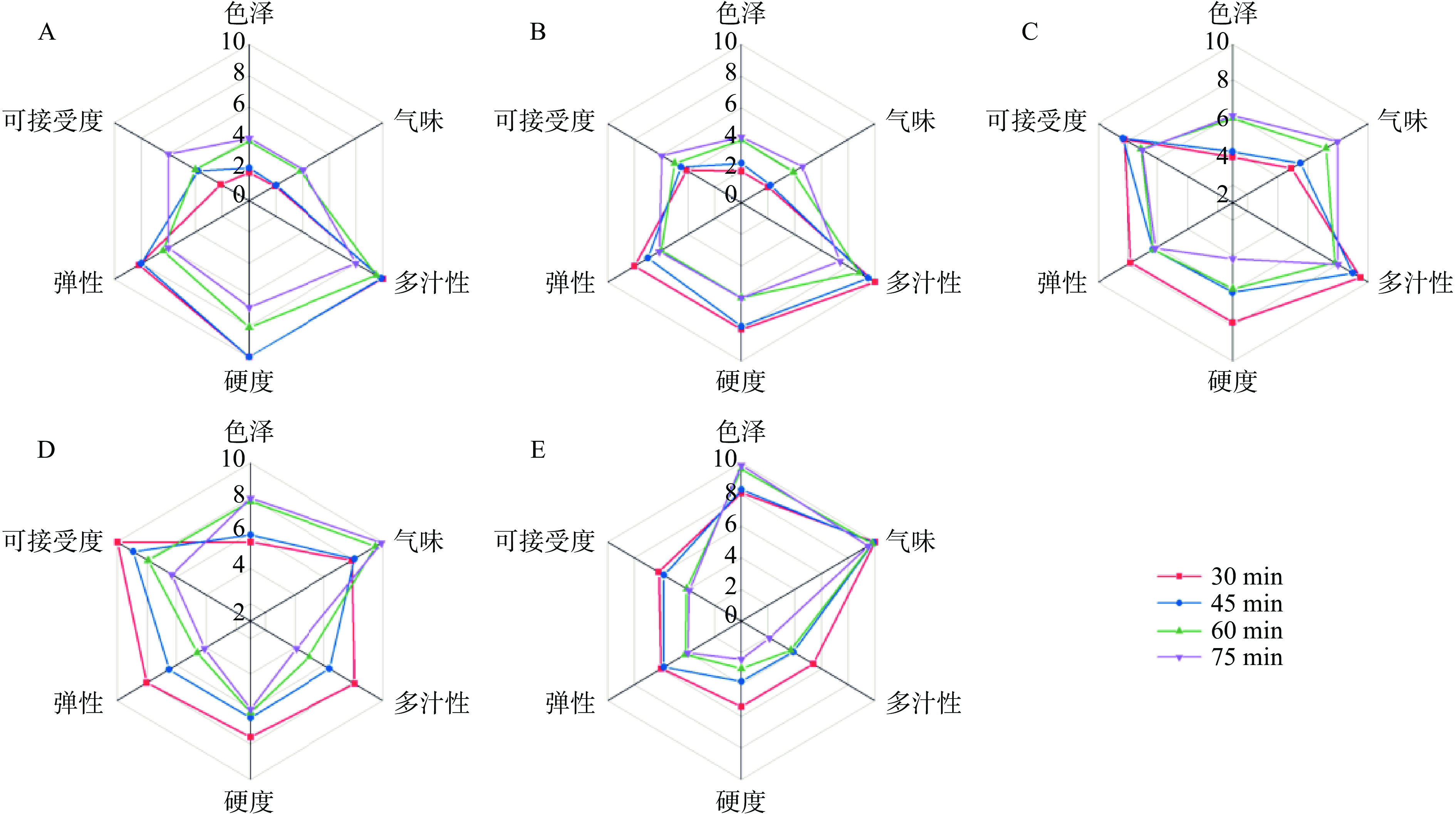
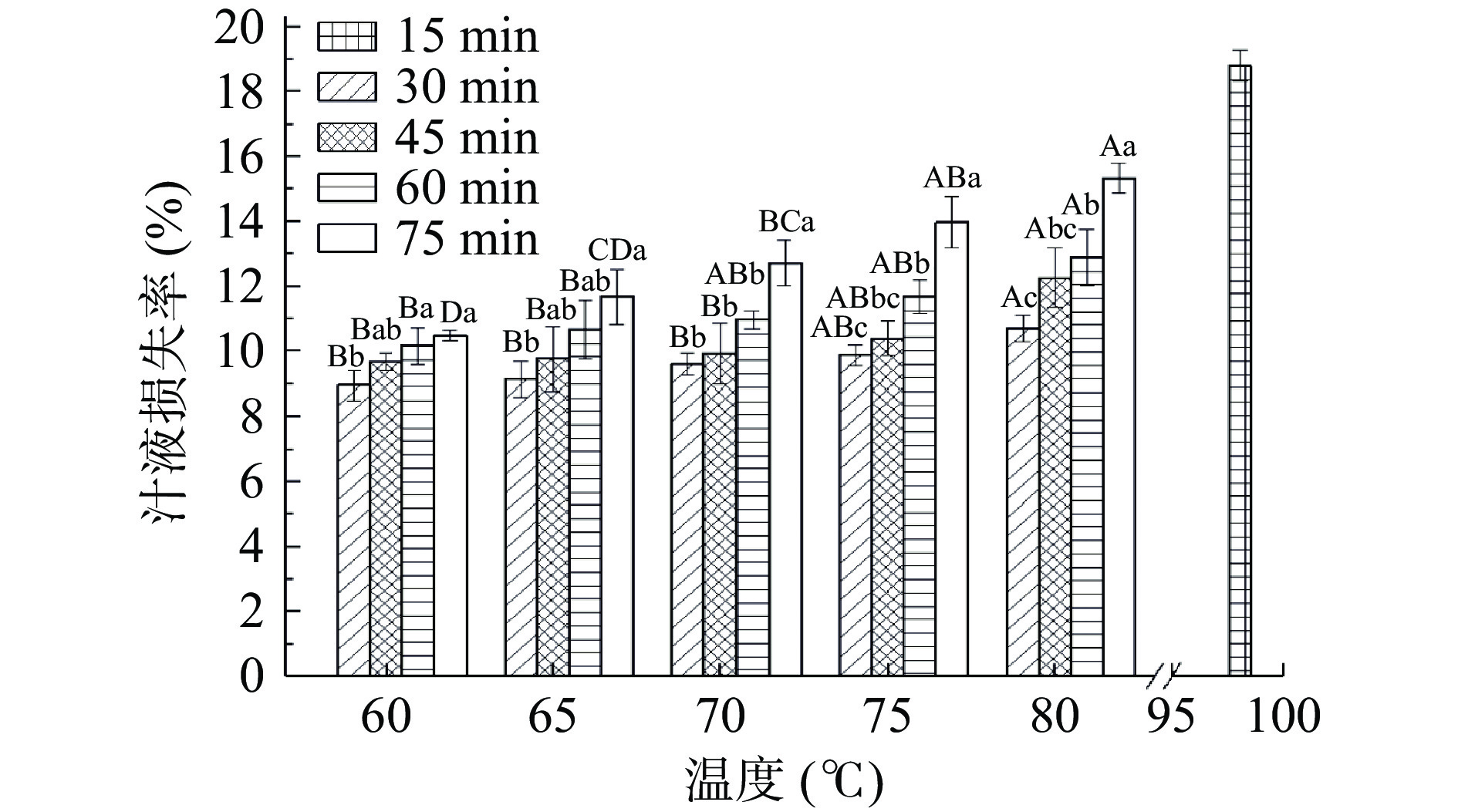
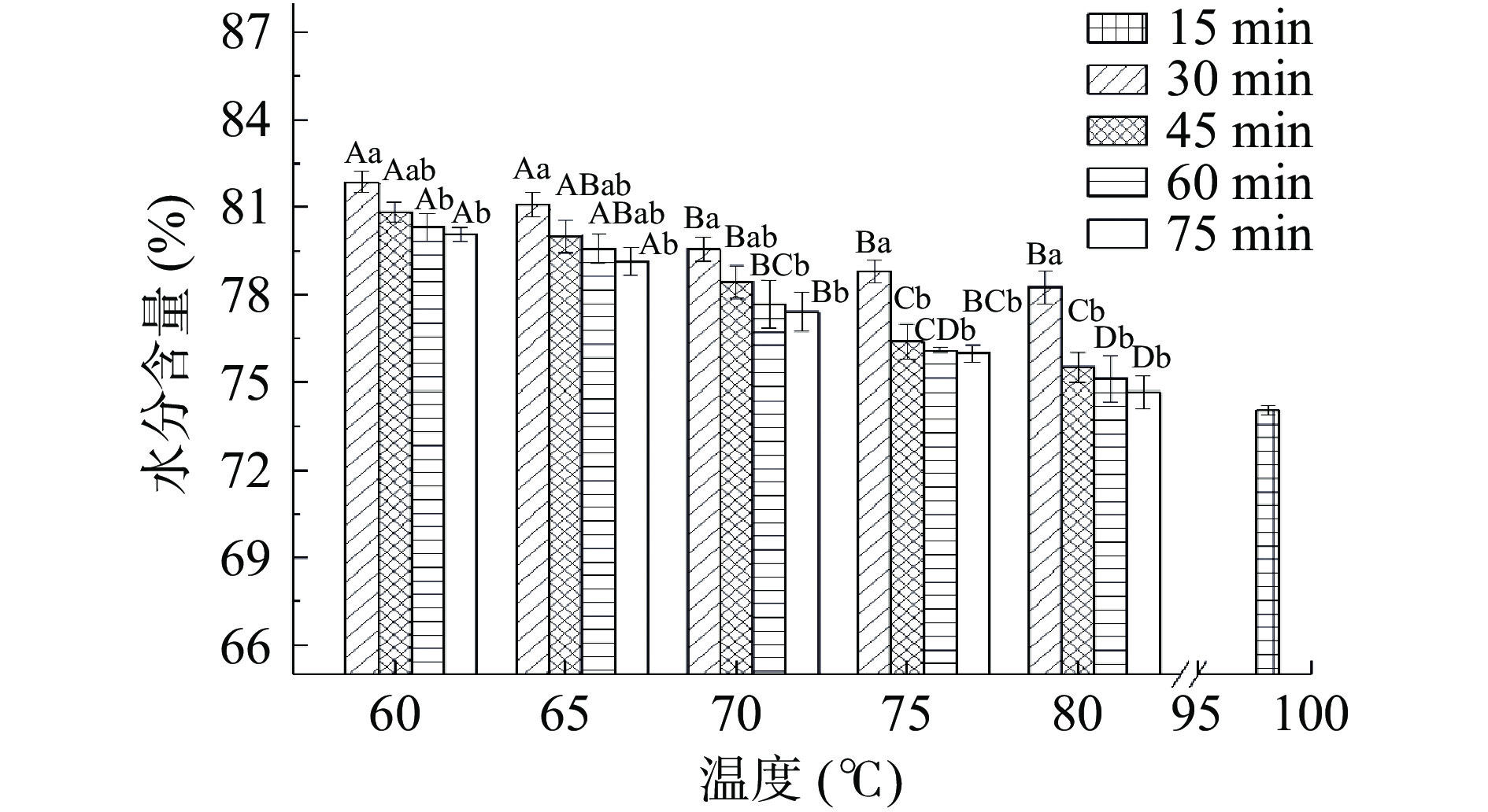
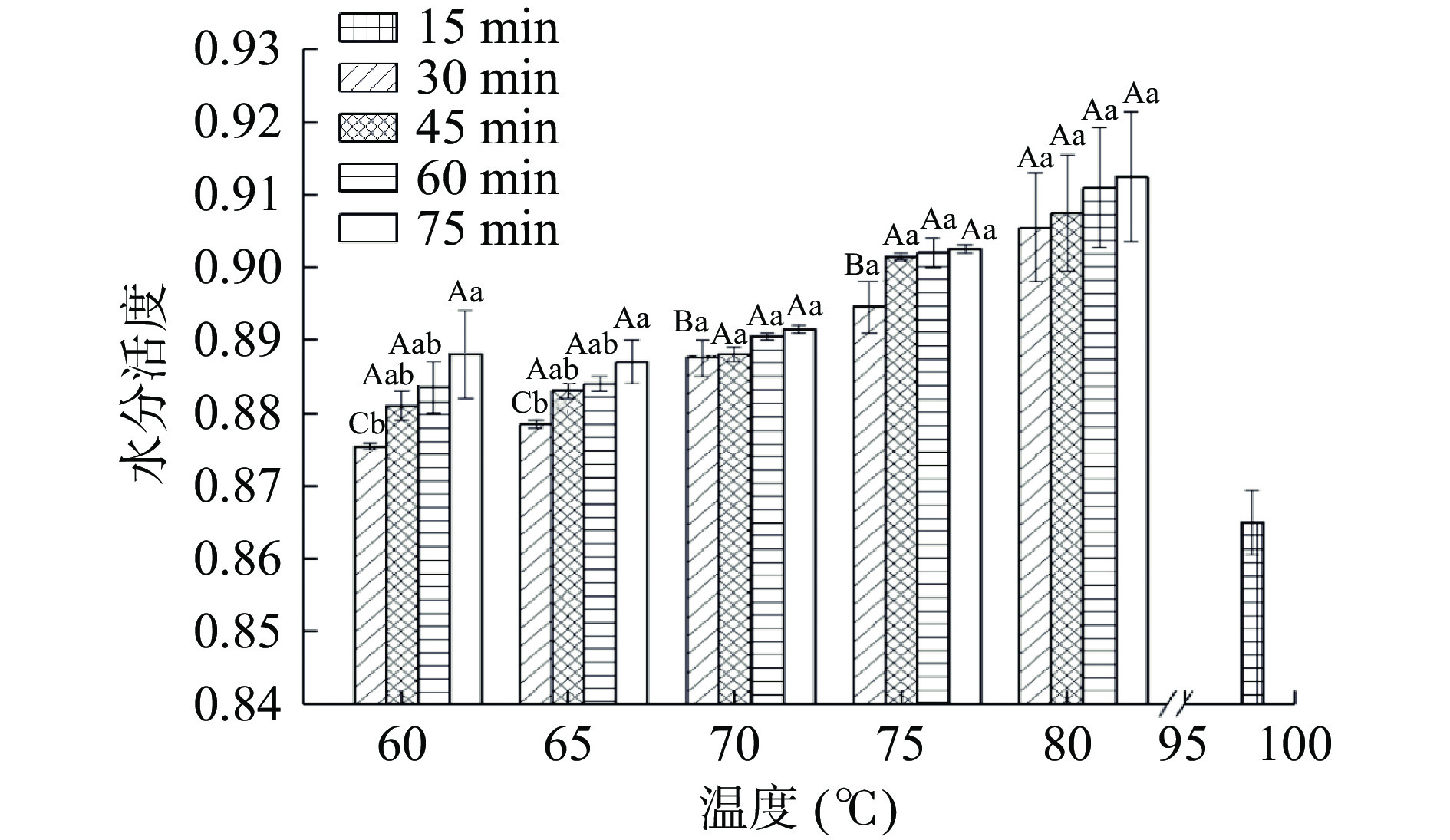
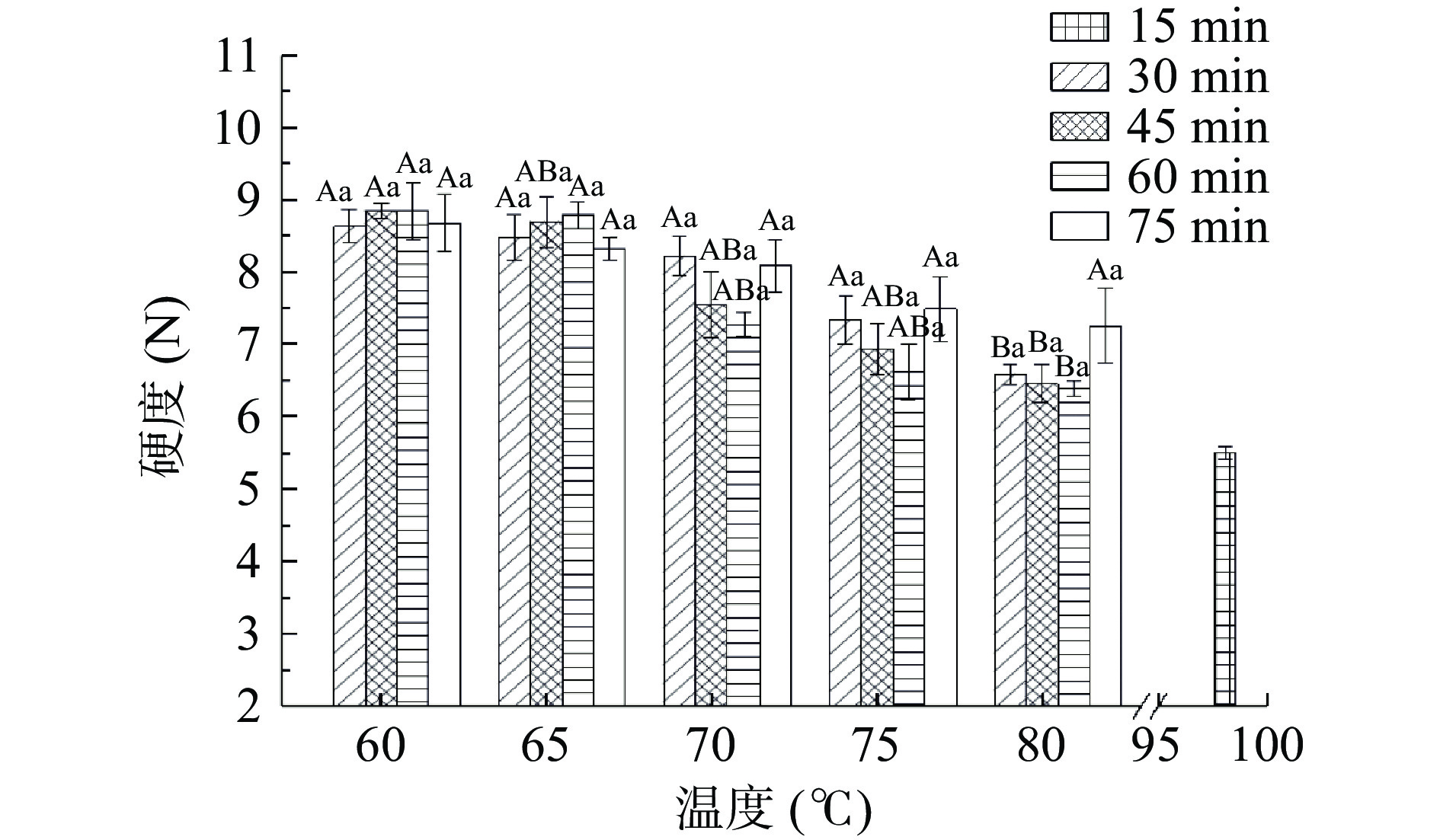
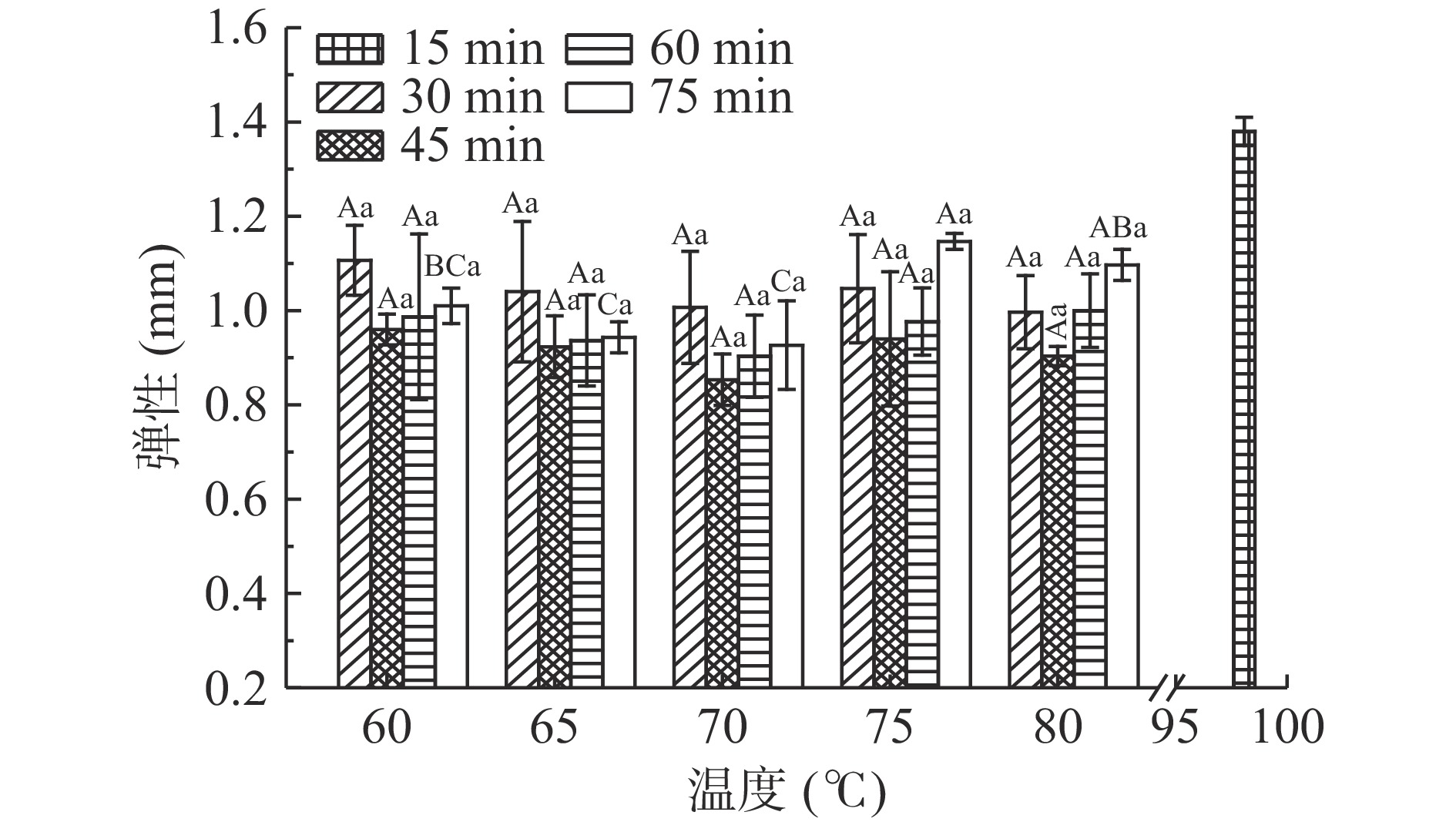
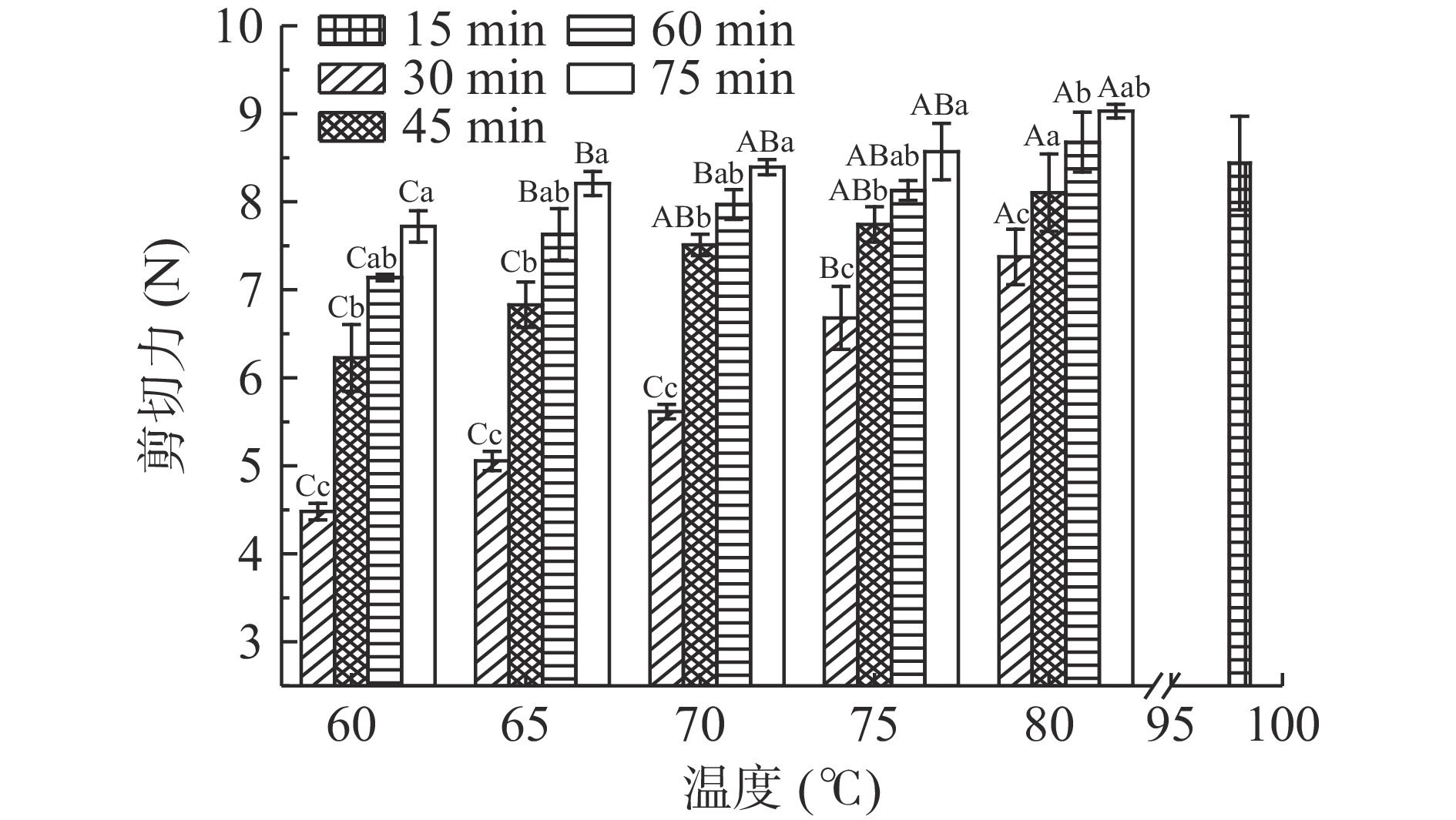
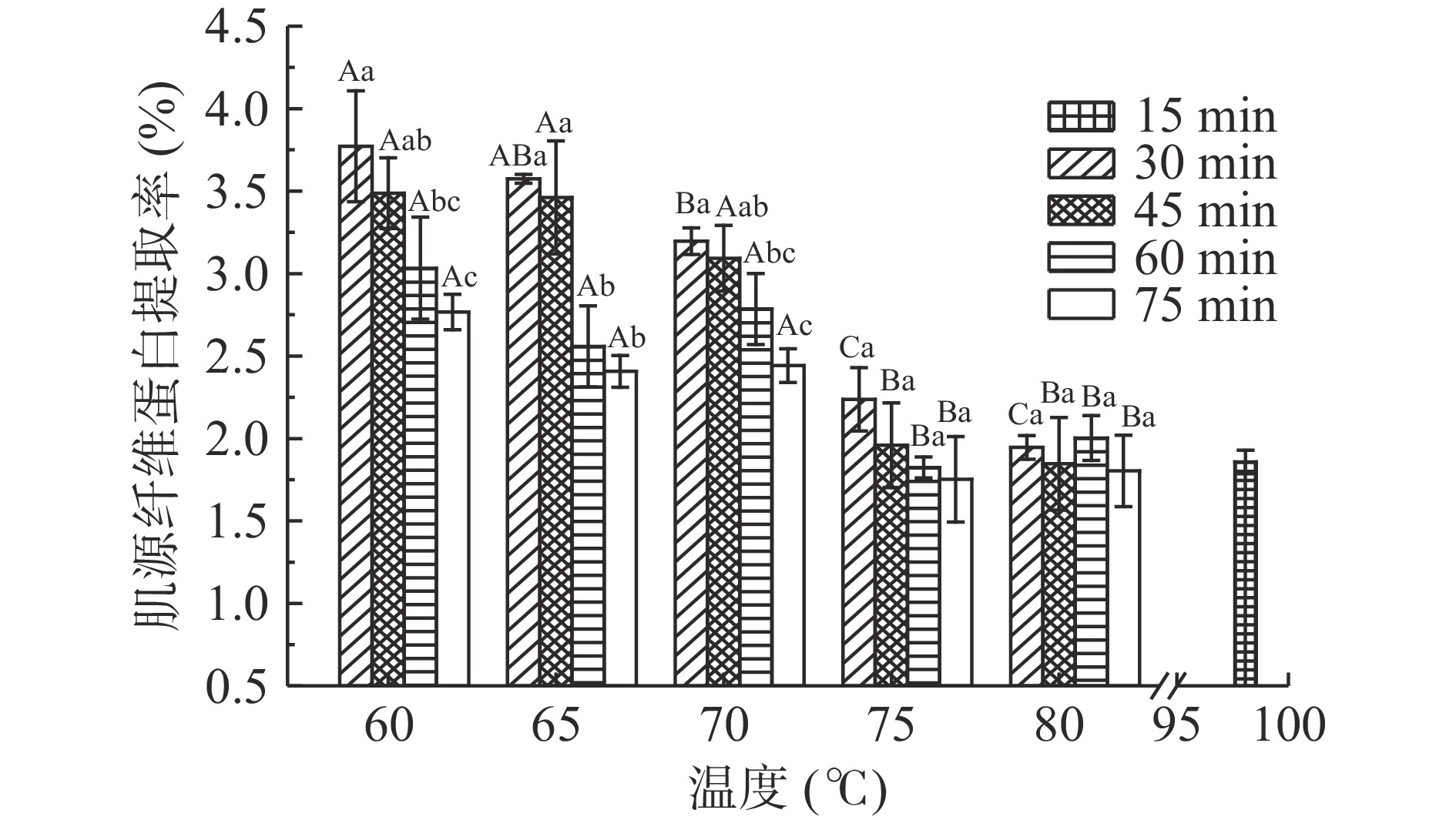
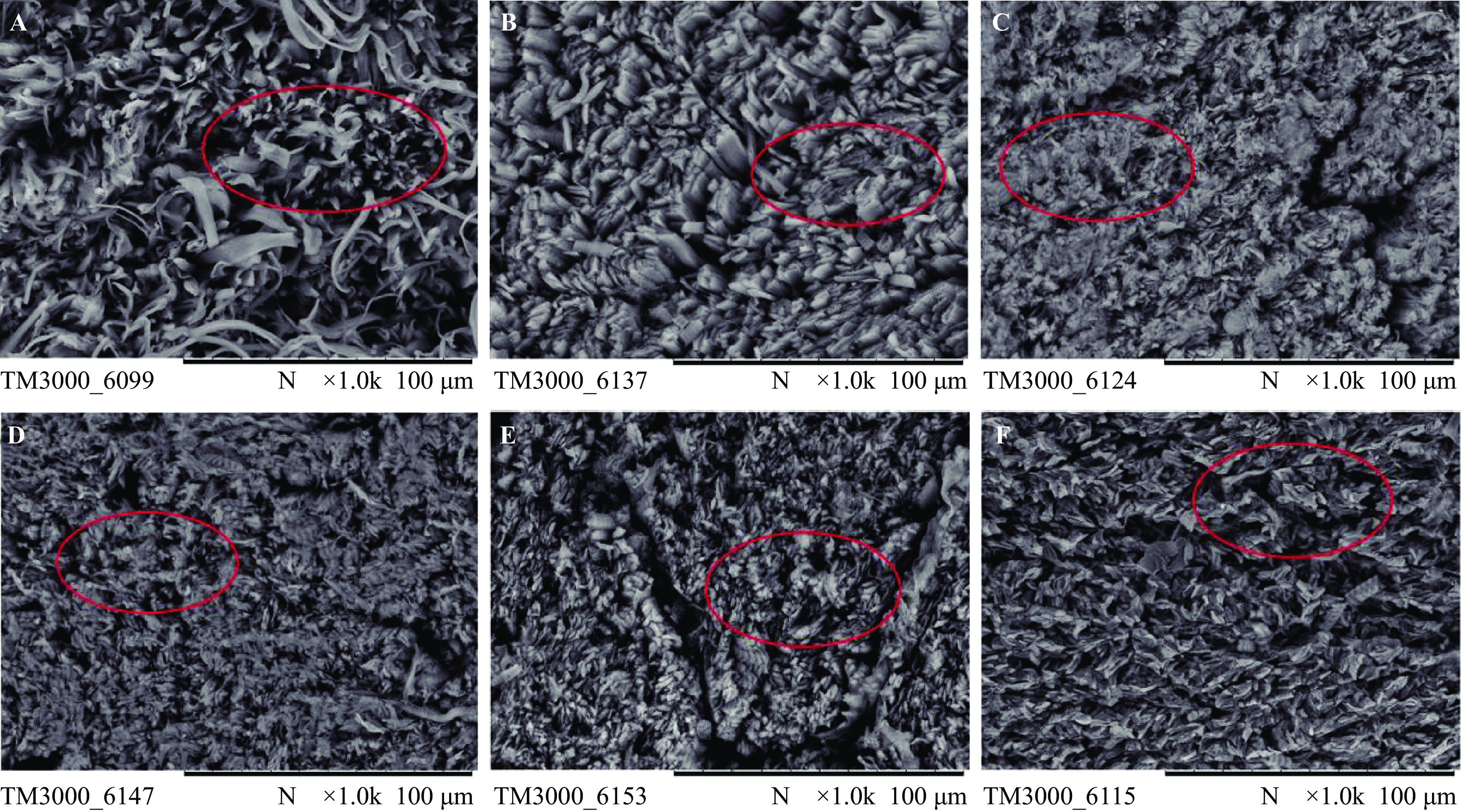
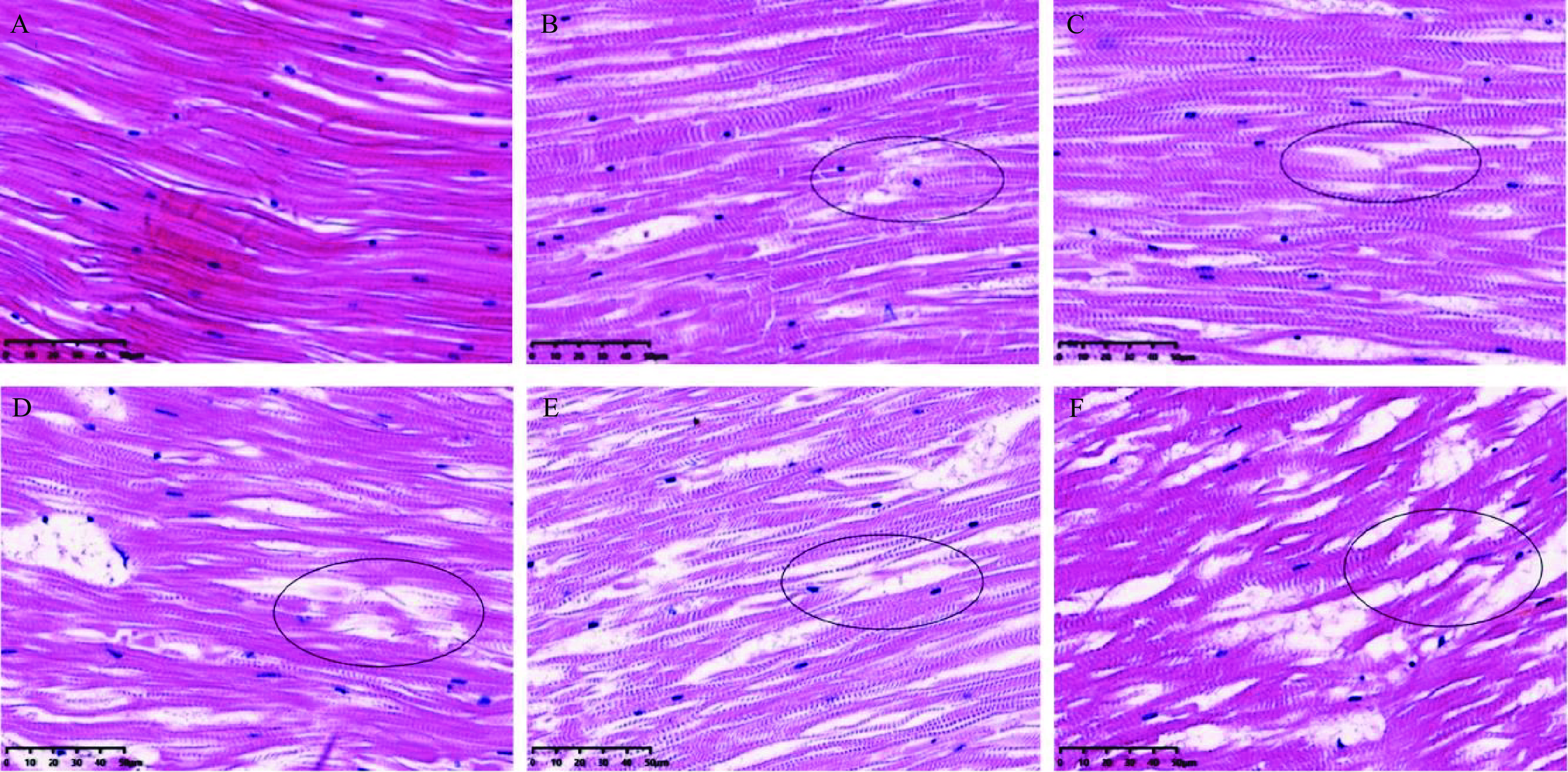
 下载:
下载:



